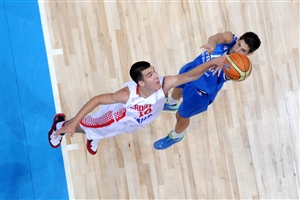
This column is a tweener
Charlotte (Steve Goldberg's Wheel World) - It's Thursday night, NBA Draft Night for those who care and if you're reading this, there's a better than average chance that you'll know who went where on the day after.
I'm writing this as I sit in the interview room at the arena named for a local cable company and home to the Charlotte Hornets who just took college player of the year Frank Kaminsky with the ninth overall pick. That was good to many of the fans filling about a third of the lower bowl and just as disappointing to many others who were hoping for Justice Winslow who would have been in Heraklion for the FIBA U19 World Championship had he not opted to go pro after one year at Duke.
At 6ft 7in (2.01m), Winslow is either a big guard or a small forward, in basketball terms a "tweener", as in the shorthand coaches and scouts use for "between".
This column is a tweener as well sliding into the quiet period after all the leagues have ended and before the zonal competitions that will decide the qualifiers for next year's Paralympic Games in Rio.
The Great Britain women's wheelchair team are tweeners. Not in the sense of their actual positions on the court but in their collective position as a major player on the world stage. They are not bad but they also have not been great and have yet to emulate the success of the men's side who have seven Paralympic (three silver, four bronze) and four World Championship (one gold, two silver, one bronze) medals to their merit.
In Europe, they have been the third best team since 1995, taking the bronze in eight of nine competitions, falling to fourth in 2005 as the inspired French women took third at home. It's always been a distant third though as Germany and the Netherlands have dominated Europe and the only others in the upper echelon of the women’s game with Canada, the USA and Australia.
As host nation for the IWBF Euro 2015 that will be played at the University of Worcester from August 28 to September 6, they will have the crowd support and securing one of the four spots for Rio is their minimal goal. This team wants to make a statement.
Indeed, British Wheelchair Basketball said as much themselves when they went outside the family to hire American coach Miles Thompson away from the University of Alabama where he built a championship level program. He had also worked with the USA Paralympic and World Championship teams.
"I'm excited about this team: it's full of potential and it’s fun to work with potential," says Thompson of the final 12 on his roster. "It's filled with some seasoned players and some emerging players that I think are really on the cusp of finding their game, finding out who they are as basketball players - and that journey’s always exciting. The squad's filled with talent."
But that potential has to be realized with results.
"Our goal for the European Championships is to do something that hasn't been done and that's get to the final. Obviously you have to go through the Germans and the Dutch who are the benchmark – we want to be the benchmark."
As the ladies of Great Britain's women's wheelchair basketball team are looking to cover new ground, so is a young Irish woman.
The sport of wheelchair basketball, like any other adaptive sport, can be broadly described as a victory born out of loss. Just competing means that an obstacle has been overcome. In that respect, a story of loss can also be seen as one of victory yet to come.
That's evident in the words of Clodagh Cogley, 21, one of the seven Irish students hurt in a Berkeley, California balcony collapse last week that tragically killed six other students. She was quoted this week saying that she may never walk again due to a broken spinal cord, but expressed hope and spoke of possibly taking up wheelchair basketball.
A San Francisco media site reported her Facebook post that marked one of the first statements by a victim of the June 16 disaster, which occurred during a birthday party at a fifth-floor apartment near the University of California's Berkeley campus.
"Hey friends, just an update to let you guys know how I'm getting on (slowly catching up with the individual messages I promise!)," she wrote. "The fall from the balcony left me with 2 collapsed lungs, a broken shoulder, a broken knee, 5 broken ribs and a broken spinal cord ... Meaning the chances of me using my legs again are pretty bleak."
Here's a heads-up to Basketball Ireland, which oversees the 10 team wheelchair hoops league on the Emerald Isle.
Cogley was already looking towards the future and said she intended to give rehabilitation.
"Everything I've got. Who knows; maybe legs have been holding me back all these years and I'll realize my talent for wheelchair basketball," she said.
Maybe she will. And maybe this will be the year the British women serve notice of their intentions as well.
Steve Goldberg
FIBA
FIBA's columnists write on a wide range of topics relating to basketball that are of interest to them. The opinions they express are their own and in no way reflect those of FIBA.
FIBA takes no responsibility and gives no guarantees, warranties or representations, implied or otherwise, for the content or accuracy of the content and opinion expressed in the above article.
To help make this column as inclusive as possible, please send any national or international event information, story suggestions, or comments to wheelworldmail@gmail.com.

















